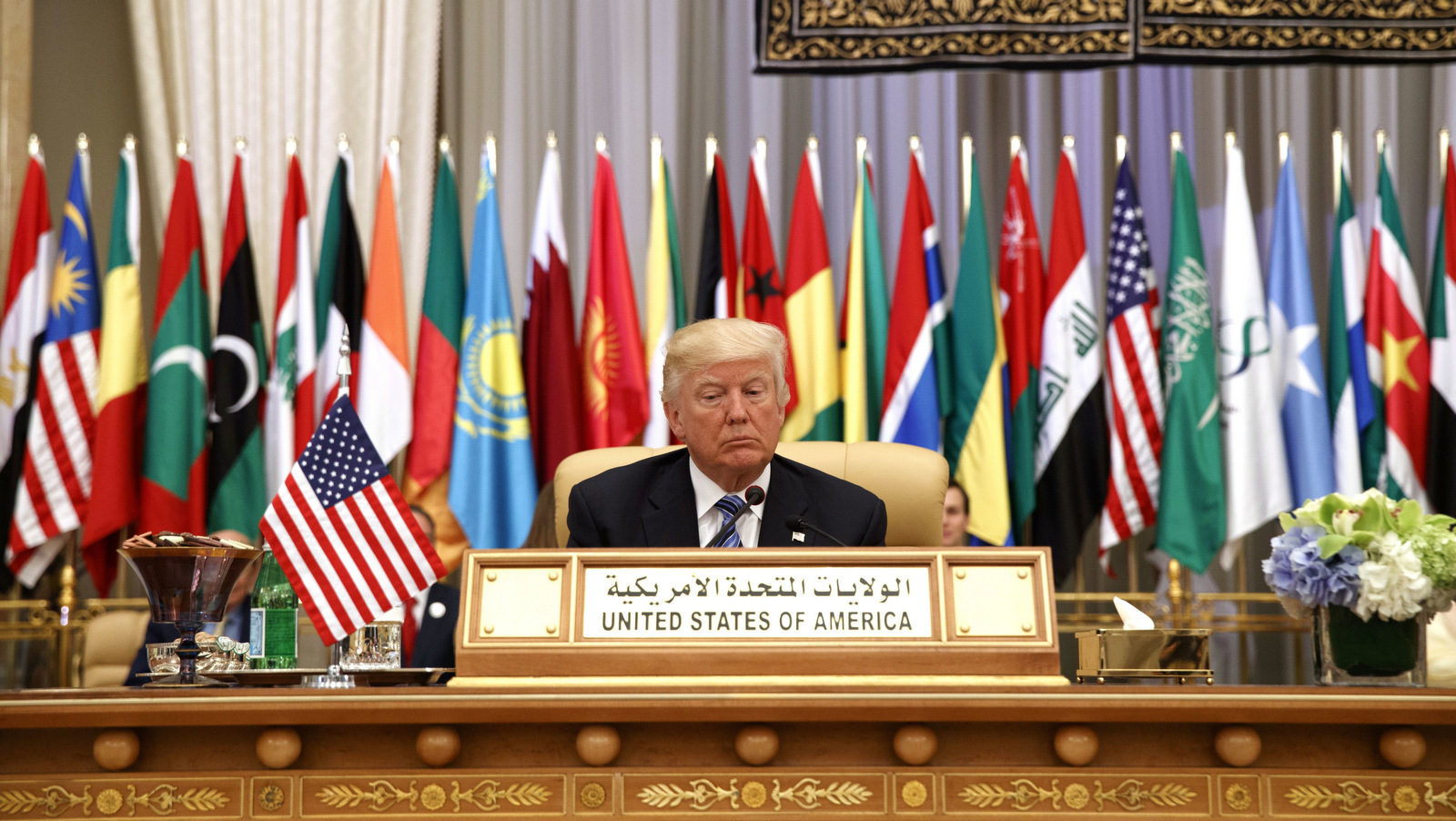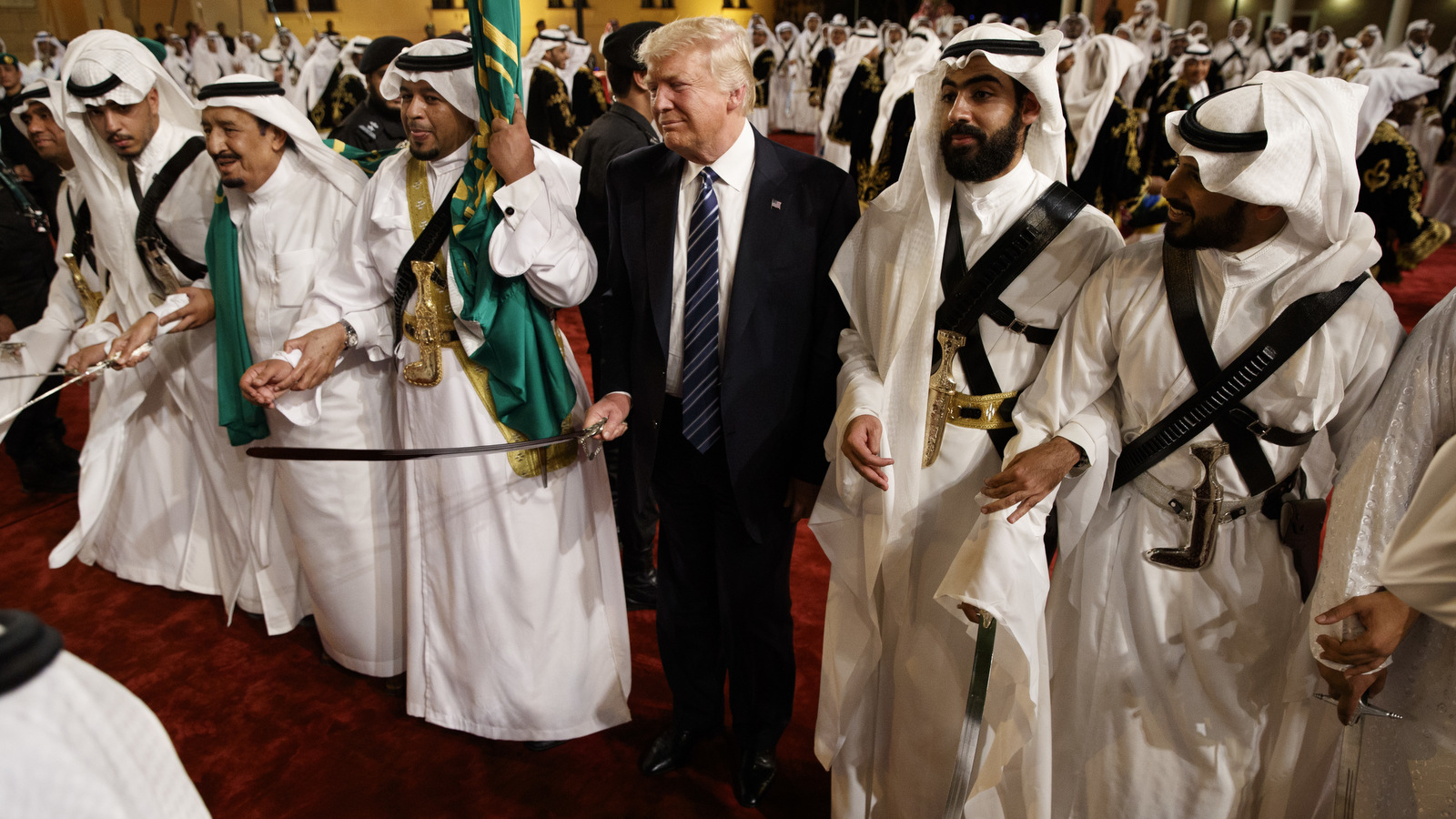
President Donald Trump waits to deliver a speech to the Arab Islamic American Summit, at the King Abdulaziz Conference Center in Riyadh, Saudi Arabia, May 21, 2017. (AP/Evan Vucci)
BEIRUT (Opinion) — The Arab Islamic American Summit held in Riyadh on May 20 and 21 was an extraordinarily surrealistic event, to say the least. Many factors made the event highly unusual, not the least of which was its timing. The summit was held just after the anniversary of Nakba Day, which marks the loss of Palestine in May 1948. In addition, thousands of Palestinian prisoners in Israeli jails entered the fourth week of their ongoing hunger strike as the summit was held.
The Summit also took place in the immediate aftermath of Iran’s presidential election, where the summit’s host was betting on President Hassan Rouhani’s failure and the arrival of a hardliner in the person of candidate Ebrahim Raisi. Rouhani ended up winning the election, much to Saudi Arabia’s dismay.
In the views of the majority of Arabs and Muslims, the summit was a direct assault on the long-held Arab and Muslim cultural and political legacy. Two major Muslim countries were glaringly absent: Turkey and Iran. Egypt’s delegation, headed by President Abdel el-Sisi, expressed the need to condemn countries that have contributed to the development of extremist thought. Many observers believed he was referring to Turkey and Qatar, yet his remarks would perfectly fit Saudi Arabia. His speech threw a discordant note into the artificial spectacle of a unified Arab and Muslim front against “terror,” when in fact it was a summit against Iran.
The other factor making the event so strange was the sight of the president of the United States standing and dancing with the king of a country whose nationals participated in the 9/11 terror attacks. Many in the United States believe that Saudi Arabia itself was involved in the attacks. Just last year, Congress passed a law making it possible for the relatives of 9/11 victims to sue the government of Saudi Arabia – yet President Donald Trump concluded his visit with the largest U.S.-Saudi arms deal in history.

Donald Trump holds a sword and sways with traditional dancers during a welcome ceremony at Murabba Palace, in Riyadh, Saudi Arabia, May 20, 2017. (AP/Evan Vucci)
Surrealism was also seen in the spectacle of some forty Arab and Muslim countries purporting to take a unified stand against extremism and terror, yet with Turkey and Iran absent. The summit was truly meant to show Sunni solidarity against Shia Iran, although many attendees clearly had other thoughts.
The body language of many Arab and Muslim heads of state suggested that they were attending against their will – their absence of enthusiasm was followed by their lukewarm applause after the Saudi king’s and president’s speeches. Not all Sunnis are keen to confront Shias and Iran, and the conflict between Saudi Arabia and Iran is not sectarian, but political.
The summit could be best described as a “fool’s bargain” – both the U.S. and Saudi Arabia thought they got the “better” deal – but in reality, both miscalculated the ability of their partner to deliver on their commitments. The U.S. will not be able to provide the protection the Saudis are seeking, and Saudi Arabia may not provide the payments required for its new arms deal. The American media covering the summit were quite dismissive of the deals and doubted that the arms transaction would pass. Later on, Israeli sources indicated that Israeli Prime Minister Benjamin Netanyahu’s government had “voiced concerns” about the size and components of the arms deal.
Related: Israel, Saudi Arabia Join Forces To Champion War With Iran
Another factor that may reinforce the “fool’s bargain” characterization is the serious adversity Trump is facing at home. Whether he will be able to remain in office is now a matter of debate. At best, he may be a lame duck for the rest of his term – at worst, he may resign or face impeachment. It is not clear that an administration under Vice President Mike Pence would continue Trump’s policies.
Congress may not be in the mood to placate the Saudis and the mainstream media is not going to help either. It is also doubtful that the famed Israeli lobby will be able to persuade Congress to deliver on this front, as it suffered crushing defeats in the last two presidential elections. In addition, one may wonder whether the lobby is willing to challenge the general mood in the country towards Saudi Arabia, despite having retained powerful lobbyists on both sides of the aisle.
Saudi Arabia’s Delusions
The Saudis and their affiliated media claimed the summit was a “huge success.” One may beg to differ with such an assessment. On paper, the U.S. seems to have gotten the better deal, signing agreements worth nearly half a trillion U.S. dollars. But in reality, the only solid commitment is the $110-billion-dollar arms deal, and even that transaction will need congressional approval and is not a “done deal.” In fact, the government of Riyadh may not get to implement the deal at all.
On the Saudi side, the kingdom may claim on paper that it leads the Arab and Muslim world, a position it has been seeking for decades. But the summit laid bare significant divergences and a lack of harmony among participating countries. With the exception of el-Sisi’s speech – a wrench thrown into the cogs – there was little participation on the part of other countries, as the hosting King decided to cut the speech session short in order to prevent any greater dissonance.
But the cherry on top was the way Saudi Arabia released the final statement for the summit, with attendees only learning of its contents on their plane ride home. Lebanese Foreign Minister Gibran Bassil spilled the beans, saying “We were not aware of the announcement in Riyadh; rather we thought that no statement would be issued after the summit and we were surprised by its issuance and content when we were on the plane returning to Lebanon.”

Saudi King Salman, second right, walks with US President Donald Trump to attend the Arab Islamic American Summit, at the King Abdulaziz Conference Center, May 21, 2017, in Riyadh, Saudi Arabia. (AP/Evan Vucci)
The cracks in Saudi Arabia’s façade became clear immediately after the summit. Saudi media launched a savage attack on the Emir of Qatar for an alleged call for a political discussion with Iran, which is considered anathema within Saudi circles. Some even believe their spat could lead to an invasion of Qatar by the Saudis and the possibility of regime change, if not an outright annexation of the peninsula. Border disputes have festered between the two sides and Riyadh may have already gotten its blessing from the U.S., when Trump singled out Iran as a source of terrorism and instability in the region. Qatar is now in the hot seat.
Another lowlight of the summit was when Trump told the King of Bahrain that human rights issues would not alter the country’s relationship with the U.S. Indeed, less than 24 hours after the summit ended, Bahraini authorities stepped up their crackdown on protest in the country by invading the home of respected cleric Sheikh Issa Kassem.
Related: 5 Things You Need To Know About What’s Going On With Qatar
The irony in all this is that Trump indicated clearly that the United States will not fight on the behalf of Gulf states, leaving them to fend for themselves. But the performance of the Saudi-led coalition in Yemen has cast significant doubts on its ability to fight on its own. One has to wonder why the Saudis offered all of that money to the U.S.
There is also the matter of the resumption of attacks against Christian Copts in Egypt after the summit. One may ask if the government of Riyadh is looking to destabilizing Egypt if it cannot secure its total allegiance.
The credibility of the Saudi royals is also at stake. Their ability to make good on their financial commitments is now subject to great scrutiny. The government has significantly depleted its financial reserves because of foolish decisions, such as its fruitless assault on Yemen and its decision to flood the oil market in order to put pressure on its rivals. The latter decision backfired, as revenues plummeted in conjunction with increased spending on endless wars in Syria, Iraq and Yemen. The government has had to implement austerity measures targeting civil servants, the military and security forces. One needs to remember that the government employs two-thirds of the Saudi workforce and its labor pool is twice the size of that of the private sector.
The impact of the austerity measures has significantly challenged stability in the kingdom, which subsequently rescinded its austerity measures and restored allowances and privileges that had been taken away. The question now is: how long can the kingdom sustain such expenditures, both domestically and on the international front? The ability to borrow in foreign marketplaces is there, but it will be at an increasing and prohibitive cost.
Many observers believe that the Saudi royals have taken such measures to ensure the political base of the 31-year-old deputy crown prince Mohammad Bin Salman. It is not clear at this stage how much support there is for austerity among the Saudi princes. Many have expressed their displeasure via social media, while others are waiting. The rivalry between the crown prince and his deputy is now in the open, with a lot of uncertainty about the outcome.
But at the end of the day, the summit may turn out to be much ado about nothing. Sayed Hassan Nasrallah, the general secretary of Hezbollah and leader of the Islamic Resistance, has dismissed the summit as being of little consequence. It is unlikely that Saudi Arabia will be able to lead a Sunni coalition against Iran. And it is also unlikely that its policies in Yemen, Iraq, Syria, Egypt and Libya will be successful.
The views expressed in this article are the author’s own and do not necessarily reflect Mint Press News editorial policy.
Source Article from http://www.mintpressnews.com/arab-islamic-american-summit-2017-u-s-made-fools-bargain-saudi-arabia/228701/
 RSS Feed
RSS Feed















 June 9th, 2017
June 9th, 2017  Awake Goy
Awake Goy 





 Posted in
Posted in  Tags:
Tags: 













